Mr. Brooks
 At the very beginning of Mr. Brooks, the following words flash upon the screen...
At the very beginning of Mr. Brooks, the following words flash upon the screen..."The Hunger has returned to Mr. Brooks' brain. It never really left".
I smiled a little when I read that. It sounded like the opening sentence of some kind of trashy murder novel. And if you strip away the big name actors and sleek production values, that's what you'll find Mr. Brooks is. The movie piles on so many serial killers, double identities, blackmailers, and ominous people that it becomes hard to take the film seriously as it goes on. It's not enough to have the lead character be a serial killer. No, there has to be a wannabe one, a potential one, and one who's just there for no real reason. The movie becomes bogged down in so many plots and characters, when all we really want is the title character himself.
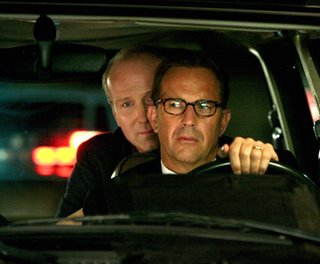 The name in the title refers to Earl Brooks (Kevin Costner), a seemingly upstanding middle aged man who runs a box factory, and is the pride of his local community. What his loving wife (Marg Helgenberger) and trusting young adult daughter (Danielle Panabaker) do not realize is that mild mannered Earl is leading a double life. At night, he sometimes likes to sneak into people's homes after spying on them for a short while, and murder them. His signature is always leave a bloody thumbprint of his victim's somewhere in the room, thus being dubbed "The Thumbprint Killer" by the media. Earl has been able to resist his murderous urges for two years now, but thanks to the nagging of a twisted voice inside his head, who takes the form of an imaginary man named Marshall (William Hurt) that only Earl can see and hear, Brooks is starting to get back into the murder business. Hard-boiled detective, Tracy Atwood (Demi Moore) is hot on Earl's trail, but she also has to deal with her ex-husband who is trying to scam millions out of her in divorce settlements, and an escaped convict who is trying to murder her, since Tracy put him behind bars in the first place.
The name in the title refers to Earl Brooks (Kevin Costner), a seemingly upstanding middle aged man who runs a box factory, and is the pride of his local community. What his loving wife (Marg Helgenberger) and trusting young adult daughter (Danielle Panabaker) do not realize is that mild mannered Earl is leading a double life. At night, he sometimes likes to sneak into people's homes after spying on them for a short while, and murder them. His signature is always leave a bloody thumbprint of his victim's somewhere in the room, thus being dubbed "The Thumbprint Killer" by the media. Earl has been able to resist his murderous urges for two years now, but thanks to the nagging of a twisted voice inside his head, who takes the form of an imaginary man named Marshall (William Hurt) that only Earl can see and hear, Brooks is starting to get back into the murder business. Hard-boiled detective, Tracy Atwood (Demi Moore) is hot on Earl's trail, but she also has to deal with her ex-husband who is trying to scam millions out of her in divorce settlements, and an escaped convict who is trying to murder her, since Tracy put him behind bars in the first place.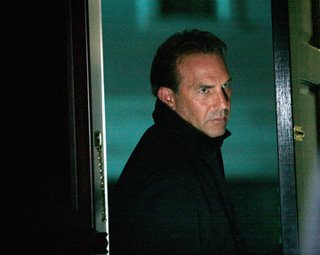 To make matters even more complicated, the night when Earl committed his most recent violent act, he was unknowingly seen by a slimy photographer and peeping tom by the name of Mr. Smith (comic actor Dane Cook in his first dramatic role), who just happened to be spying on the couple that Brooks murdered. Smith decides to blackmail Earl. He won't go to the cops with his photographic evidence if Earl will teach him how to kill. So, not only must Earl try his best to ignore this imaginary man named Marshall urging him to kill again, he's got this wacko trying to learn his private business. But that's still not enough for this movie. There's also a subplot concerning Earl's daughter, and a secret that she may be keeping from the rest of the family. Everything threatens to explode all at once, and poor Earl becomes tortured trying to make sense of it all, as does the audience.
To make matters even more complicated, the night when Earl committed his most recent violent act, he was unknowingly seen by a slimy photographer and peeping tom by the name of Mr. Smith (comic actor Dane Cook in his first dramatic role), who just happened to be spying on the couple that Brooks murdered. Smith decides to blackmail Earl. He won't go to the cops with his photographic evidence if Earl will teach him how to kill. So, not only must Earl try his best to ignore this imaginary man named Marshall urging him to kill again, he's got this wacko trying to learn his private business. But that's still not enough for this movie. There's also a subplot concerning Earl's daughter, and a secret that she may be keeping from the rest of the family. Everything threatens to explode all at once, and poor Earl becomes tortured trying to make sense of it all, as does the audience.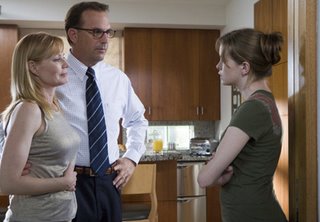 For a movie with such a simple title, Mr. Brooks sure is complicated. The movie seems to want to be a look into the mind of a normal man who is helplessly addicted to murder, and the rush that it gives him. The way that it handles this is somewhat clever, with William Hurt taking the physical form of Brooks' darker side. The conversations that Costner and Hurt have in all of their scenes together are actually an internal back and forth debate, with both the rational and murderous side of Brooks' brain struggling for control of the man. Costner represents the sane side of his character, while Hurt camps it up with evil glee as the side he chooses not to show people. When the movie is dealing with the main character's struggle within, it is constantly on the verge of being interesting. Co-writer and director Bruce A. Evans (a man who has had a very diverse screenplay career, ranging from the very good coming of age drama Stand By Me, to the awful mid-90s pirate film, Cutthroat Island) has a lot of fun with this idea, even adding some intentional dark laughs in the back and forth between the actors representing both sides of the character. The problem is, the movie doesn't seem to have enough faith in this clever idea, and thinks we'd be more interested in seeing Detective Tracy Atwood's divorce struggle.
For a movie with such a simple title, Mr. Brooks sure is complicated. The movie seems to want to be a look into the mind of a normal man who is helplessly addicted to murder, and the rush that it gives him. The way that it handles this is somewhat clever, with William Hurt taking the physical form of Brooks' darker side. The conversations that Costner and Hurt have in all of their scenes together are actually an internal back and forth debate, with both the rational and murderous side of Brooks' brain struggling for control of the man. Costner represents the sane side of his character, while Hurt camps it up with evil glee as the side he chooses not to show people. When the movie is dealing with the main character's struggle within, it is constantly on the verge of being interesting. Co-writer and director Bruce A. Evans (a man who has had a very diverse screenplay career, ranging from the very good coming of age drama Stand By Me, to the awful mid-90s pirate film, Cutthroat Island) has a lot of fun with this idea, even adding some intentional dark laughs in the back and forth between the actors representing both sides of the character. The problem is, the movie doesn't seem to have enough faith in this clever idea, and thinks we'd be more interested in seeing Detective Tracy Atwood's divorce struggle.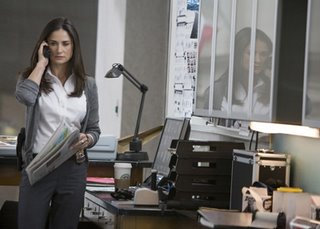 I want to know who looked at this screenplay and thought this would be a good idea. If the movie is called Mr. Brooks, why does it keep on trying to turn our attention away from him? While Costner gets plenty of screen time during the film, a lot of his scenes either don't deal with his internal struggle enough, or they don't deal with it at all. Instead, we get a lot of scenes of him driving around with the wannabe serial killer, Mr. Smith, observing various people. And even though the character of Tracy Atwood is supposed to be on his trail, she never seems really determined to the case as she should be. Most of her scenes revolve around being angry at her ex-husband, or being on the run from another serial killer who is trying to wipe her out after escaping from prison. This other serial killer character is completely unnecessary, distracts us from the killer we're supposed to be concentrating on, and is just a plain bad idea that should have been written out of the script at an early stage. He brings nothing to the film itself, has nothing to do with the actual plot, and acts only as pointless filler. For some reason, the filmmakers thought the movie needed another serial killer and/or deranged individual. My question is why? You've got a great thing with Mr. Brooks and his internal struggle. Heck, I would have loved to have seen a movie that just revolved around Costner and Hurt's characters, as their scenes are the only moments the film displays any actual thought. The rest is your standard string of moldy serial killer cliches that have been seen in too many bargain basement thrillers and prime time TV cop dramas.
I want to know who looked at this screenplay and thought this would be a good idea. If the movie is called Mr. Brooks, why does it keep on trying to turn our attention away from him? While Costner gets plenty of screen time during the film, a lot of his scenes either don't deal with his internal struggle enough, or they don't deal with it at all. Instead, we get a lot of scenes of him driving around with the wannabe serial killer, Mr. Smith, observing various people. And even though the character of Tracy Atwood is supposed to be on his trail, she never seems really determined to the case as she should be. Most of her scenes revolve around being angry at her ex-husband, or being on the run from another serial killer who is trying to wipe her out after escaping from prison. This other serial killer character is completely unnecessary, distracts us from the killer we're supposed to be concentrating on, and is just a plain bad idea that should have been written out of the script at an early stage. He brings nothing to the film itself, has nothing to do with the actual plot, and acts only as pointless filler. For some reason, the filmmakers thought the movie needed another serial killer and/or deranged individual. My question is why? You've got a great thing with Mr. Brooks and his internal struggle. Heck, I would have loved to have seen a movie that just revolved around Costner and Hurt's characters, as their scenes are the only moments the film displays any actual thought. The rest is your standard string of moldy serial killer cliches that have been seen in too many bargain basement thrillers and prime time TV cop dramas.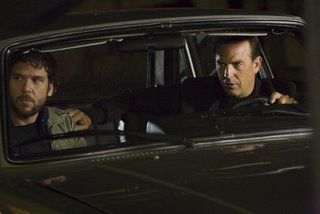 Outside of the two male leads, the rest of the cast just don't live up. Demi Moore looks wonderful, and looks like she hasn't aged in the past 10 years or so. Her character of the smart and sharp-tongued detective holds a lot of promise, but unfortunately, she plays a very small role in the film's main plot. Aside from questioning people in the building across from where Earl's victims lived, her character really does not play any part. She never gets to do any scenes with Costner, and spends most of her time griping about her ex-husband than she does investigating the murder. In his first dramatic role, comedian Dane Cook is passable, but not very memorable as the man who wants to learn Brooks' secrets of the murder trade. He's appropriately slimy and untrustworthy, but there's nothing there in his performance. He's all attitude and crazed looks, and no real personality. As Earl's wife and daughter, Marg Helgenberger and Danielle Panabaker are woefully underused, and barely even register. Panabaker gets a couple potentially intriguing moments as the daughter, but she never gets to fully exploit the possibilities other than a sequence late in the film that winds up being a total cop out.
Outside of the two male leads, the rest of the cast just don't live up. Demi Moore looks wonderful, and looks like she hasn't aged in the past 10 years or so. Her character of the smart and sharp-tongued detective holds a lot of promise, but unfortunately, she plays a very small role in the film's main plot. Aside from questioning people in the building across from where Earl's victims lived, her character really does not play any part. She never gets to do any scenes with Costner, and spends most of her time griping about her ex-husband than she does investigating the murder. In his first dramatic role, comedian Dane Cook is passable, but not very memorable as the man who wants to learn Brooks' secrets of the murder trade. He's appropriately slimy and untrustworthy, but there's nothing there in his performance. He's all attitude and crazed looks, and no real personality. As Earl's wife and daughter, Marg Helgenberger and Danielle Panabaker are woefully underused, and barely even register. Panabaker gets a couple potentially intriguing moments as the daughter, but she never gets to fully exploit the possibilities other than a sequence late in the film that winds up being a total cop out.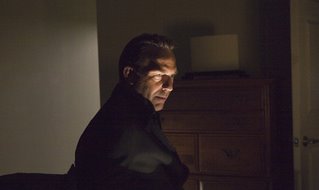 Much like this weekend's other major release, Knocked Up, Mr. Brooks would have greatly benefitted from a less is more approach. You can literally see potential everywhere you look, but it is drowned out by cliches and numerous pointless subplots vying for our attention. I wanted to know more about Earl Brooks himself. We know he's been killing people for a long time, but for just how long? How long has he been "talking" to Marshall? What ultimately pushed him down the road that we find him when the movie opens? If Brooks actually existed and gave you an in-depth look into his past and his mind, anyone would probably have a wealth of information to create a great story. It's too bad the writers of this movie didn't bother to dig deep enough into the mind of their own character. They'd have one heck of a movie if they had.
Much like this weekend's other major release, Knocked Up, Mr. Brooks would have greatly benefitted from a less is more approach. You can literally see potential everywhere you look, but it is drowned out by cliches and numerous pointless subplots vying for our attention. I wanted to know more about Earl Brooks himself. We know he's been killing people for a long time, but for just how long? How long has he been "talking" to Marshall? What ultimately pushed him down the road that we find him when the movie opens? If Brooks actually existed and gave you an in-depth look into his past and his mind, anyone would probably have a wealth of information to create a great story. It's too bad the writers of this movie didn't bother to dig deep enough into the mind of their own character. They'd have one heck of a movie if they had.






0 Comments:
Post a Comment
<< Home